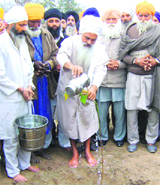
The Sacramento Bee is reporting that two elderly Sikh men were shot while going on an afternoon walk in their suburban neighborhood on Friday. One of the men, 67-year-old Surinder Singh died from the attack on Friday, and 78-year-old Gurmej Atwal is in critical condition, suffering from two gunshot wounds in his chest. The Bee article states:
Relatives and friends in the tightknit Sikh community to which the two men belong were not as hesitant to call the shooting a hate crime.
Singh and Atwal, like many Sikh men, had thick beards and wore turbans – traditions that have made Sikhs the target of bigotry and violent attacks since the Sept. 11, 2001, terrorist attacks.
“The turban is a big problem for us,” said Gurjatinder Singh Randhawa, chief editor of the Sikh newspaper Punjab Mail USA. “We look the same as Afghan Taliban – but we are not Taliban.”
Randhawa recalled the beating of a Sikh cab driver four months ago in West Sacramento.
The driver told authorities that two passengers had uttered anti-Islamic slurs as they attacked him and then beat a female passenger who tried to stop them. Police have since arrested two men on charges of felony assault with a deadly weapon and commission of a hate crime in connection with the attack.
The massive pro-democracy uprisings in North Africa and the Middle East have gained tremendous momentum since the successful ouster of Egyptian president Hosni Mubarak two weeks ago. My thoughts and prayers are with the people of Libya this week, as their calls for the end of Moammar Gaddafi’s 42-year reign have been met with brutal repression. Gaddafi’s forces (including mercenary soldiers) have killed an estimated 640 to 1,000 protesters so far in just one week. The world is watching as the people of Libya sacrifice their lives for freedom and self-determination. May Waheguru bless them in their righteous struggle against tyranny.
Check out the below report from ABC News, but note that the message at the end about US-Libya relations is highly misleading. Though the US government has a complicated history with Gaddafi, he has been a strategic ally of the US in the region for over a decade. Until Obama’s statement on Libya just yesterday (after almost a week of brutal repression), the US has turned a blind eye to any human rights concerns in Libya. While his statement strongly condemned Gaddafi’s use of violence against the protesters, Obama stopped short of calling on Gaddafi to step down.

Like many Sikhs, I grew up eating meat. It was something I never really questioned until I was in college and started learning more about the treatment of animals on factory farms and the environmental impact of the meat industry.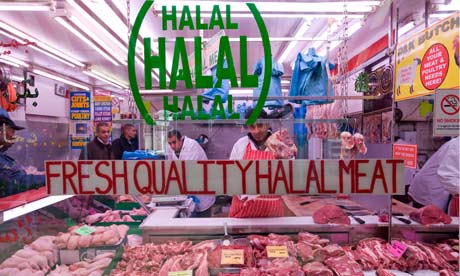
But growing up I never thought about where my spicy deep-fried chicken strips were coming from. Or the living (and dying) conditions of the cow that made up the thinly sliced pieces of meat in my Arby’s roast beef sandwich. As long is it wasn’t halal, it was all good.
I never understood what halal truly meant, but the message I got from my parents and others in the community went something like this: Halal is the way Muslims slaughter animals, and it involves killing the animal slowly and painfully. And lots of gushing blood. We Sikhs don’t believe in torturing animals, so we don’t eat halal meat. Sound like a familiar story line?
This, of course, contributed to my perception of Muslims as barbaric people who were dirty, had multiple wives and questionable morals, and killed my ancestors during partition. In the context of the messages I received from family and community growing up, the story about halal fit right in – yet another way Muslims are backwards.
As is abundantly clear in my writing on this blog, this is in stark contrast to how I see Islam and the Muslim community at this point in my life. But I grew up with these messages and stereotypes just like most of my Sikh peers did.
Really, what’s all the fuss about halal? Why aren’t Sikhs supposed to eat halal meat?
I just came across a great article on the work of Baba Sewa Singh of Khadoor Sahib, Amritsar District, and his remarkable campaign to plant trees across rural Punjab. Well worth a read.
According to [Baba Sewa Singh], they will adopt another 100 villages this year in Bathinda, Jalandhar, Patiala, Amritsar, Gurdaspur and Tarn Taran districts. “We are targeting plantation of at least 500 trees in each village, which would make a total of 50,000 trees in 100 villages every year,” he added.
Forests are vital to maintaining ecological balance in air, water and soils across Punjab. At present, only 6.5 percent of Punjab is under forests, which is even lower than the desert state of Rajasthan at 9.5 percent. Though the Punjab government plans to increase forest cover to 15 percent by 2017, ensuring that forests benefit the average person in Punjab will an important indicator of success in any afforestation effort financed by the state. Planting indigenous and native species like kikar, tahli, jamun, and neem trees, along with fruit trees in homes across villages will help ensure that the benefits derived from healthy, productive forests reach the many who still live in Punjab’s rural areas.
Since the Green Revolution was introduced in the mid-1960s, the Sikh spiritual homeland of Punjab has been faced with mounting soil erosion, water table decline, widespread chemical contamination, and continued loss of biodiversity in agriculture and forests. The Cold War era anti-revolutionary plan transformed Punjab into the breadbasket of the Indian nation state but left Punjab’s ecology in a critical state and set the agricultural economy on a path of long-term decline. Without Sikh institutions on board with the ecological reality of Punjab, the serious degeneration of the environment will continue to accelerate, and the marginalized and the poor will burden the costs of shortsighted statist policies that have exploited the natural resources of Punjab.
The week of March 14, the Gurpurab of Guru Har Rai Ji, Gurudwaras across Punjab and the Diaspora will participate in the first ever global day of reflection on the environment to reach the masses in Punjab and the world. On ‘Sikh Environment Day’ Gurdwaras across the world will focus kirtan and katha on the environment, participate in tree plantings, install environmental notice boards, start pesticide-free vegetable gardens, and host Khalsa School lessons on the environment. The SGPC, DSGPC, AGPC, are all in support of this day and celebrations will be underway at Anandpur Sahib (‘pani bachao, rukh lagao!’). We have prepared a Gurdwara Guide and shabad compilation for participating Gurudwaras and the Sikh Research Institute has also created Sikh environmental education lesson for Khalsa Schools across the diaspora.
Major outreach efforts are underway across the world, but WE NEED YOU to invite your Gurudwaras to join Sikhs across the world. Please take ten minutes of your day, ‘like’ EcoSikh on facebook, download an English or Punjabi versions of our invitations, pass them on to your Gurudwara heads, and encourage your Gurudwara to REGISTER today. We can make this happen for the future generations and create a shift in thinking on the serious degradation of Punjab’s rural and urban ecology before the process becomes irreversible.
Please visit www.ecosikh.org to learn more about Sikhism’s contribution to a sustainable future. May the Khalsa ever remain spiritually exalted, and always in service of humanity.
I recently came across information about Speaking in Tongues, a documentary which follows four diverse children on a journey to become bilingual. As the website states, “At a time when 31 states have passed “English Only” laws, four pioneering families put their children in public schools where, from the first day of kindergarten, their teachers speak mostly Chinese or Spanish.” Before I continue, take a peek at the trailer:
The film discusses the growing need that parents are feeling to raise their children multilingual.
Visit the Sikholars website and choose to register for the entire weekend or just for the conference. There are a number of exciting presentations by leading scholars in the community. Mark down your calendars from February 25-27, 2011 as Sikh professionals, academics, and activists come together in the Bay Area. Hope some of our Langar-ites can also attend!
Kicked off by Tunisia’s Jasmine Revolution last month, the massive uprisings against U.S.-backed authoritarian regimes throughout the Arab world have grown into an undeniable and unprecedented force for real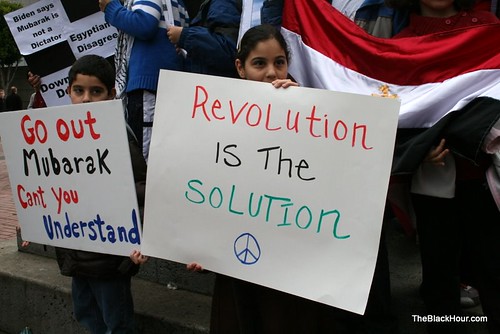 democracy.
democracy.
Since the dictators being targeted have close ties to Washington, the leaders of our government are finding themselves in a rather uncomfortable position. Senator John McCain was a little more blunt than the Obama adminstration when, on Fox News last week, he called the rise of democratic movements a “virus…spreading throughout the Middle East,” referring to this as “the most dangerous period of history…of our entire involvement in the Middle East, at least in modern times.” Obama and Clinton talk a smoother, more diplomatic talk, but the take home message is the same: “Change” in the Middle East must be on our terms.
In a column in the Guardian on Friday, Noam Chomsky wrote, “Washington and its allies keep to the well-established principle that democracy is acceptable only insofar as it conforms to strategic and economic objectives: fine in enemy territory (up to a point), but not in our backyard, please, unless properly tamed.”
Indeed, while the Obama administration pays lip service to supporting “democracy” in Egypt (after backing and funding Mubarak for the last 30 years), it has lined up long-time Mubarak aide Omar Suleiman to lead the so-called transition to a new government. The New Yorker reported that Suleiman “has served for years as the main conduit between the United States and Mubarak… [H]e was the C.I.A.’s point man in Egypt for renditions—the covert program in which the C.I.A. snatched terror suspects from around the world and returned them to Egypt and elsewhere for interrogation, often under brutal circumstances.”
That’s democracy for you, American style.
For Sikhs in the United States today, what does it mean for us to pay taxes to a government that actively works against the freedom, self-determination, and sovereignty of millions of people around the world, including our brothers and sisters in Egypt whose relentless protests have been met with violent, state-sponsored repression?
This is of course a question that I would ask all citizens of the United States, but for us Sikhs, I don’t think it is simply a political question, but also spiritual one.
Since 9/11, Sikh advocates and community members have been proactive about providing training for law enforcement officers to educate them about our religion and articles of faith and to foster positive relations between local police and Sikhs. My feelings about the role of the police in our communities aside, the Village Voice is reporting that New York City cops have been doing some learning about the Muslim community lately. But not the kind of learning that SALDEF and other Sikh organizations have been facilitating across the country.
At a recent counter-terrorism training, NYPD officers were shown a full-length, Muslim-bashing film called The Third Jihad. According to the Village Voice, the film “is 72 minutes of gruesome footage of bombing carnage, frenzied crowds, burning American flags, flaming churches, and seething mullahs. All of this is sandwiched between a collection of somber talking heads informing us that, while we were sleeping, the international Islamist Jihad that wrought these horrors has set up shop here and is quietly going about its deadly business.”
During the film, the narrator says, “Americans are being told that most of the mainstream Muslim groups are moderate when in fact, if you look a little closer, you’ll see a very different reality. One of their primary tactics is deception.”
Guest blogged by Hunny Singh
Recently I went home to the East Coast and had som e inspirational time with my family. While snowy conditions prevailed outside, inside the house, a pizza soon to be shared joined a confused and yet open love for a dance. I had an interaction with my mother that got me wanting to share with y’all. Here’s the story…
e inspirational time with my family. While snowy conditions prevailed outside, inside the house, a pizza soon to be shared joined a confused and yet open love for a dance. I had an interaction with my mother that got me wanting to share with y’all. Here’s the story…
As Ma Ji pokes her head out from behind the curtains, she pauses ever so slightly, and says:
“Remember the Guru with every passing day.”
She returns to being with the Sri Guru Granth Sahib, glasses on, focused gaze settling back in. Especially endearing to me are her engaged brows, lifted eyelashes, and soft thought.
In the dim light, I see the reflections of the Guru’s words bringing meaning upon her eyes.
Yup, I’ve seen that look before so many times.
She is in Baba Ji’s room.
I don’t remember when the Baba Ji’s* room became a part of our house and our lives, but I do remember it always being there. That’s the only name I have ever known for the room. I think this room is something that many Sikh folks share, in some way or form–a special intimate space.
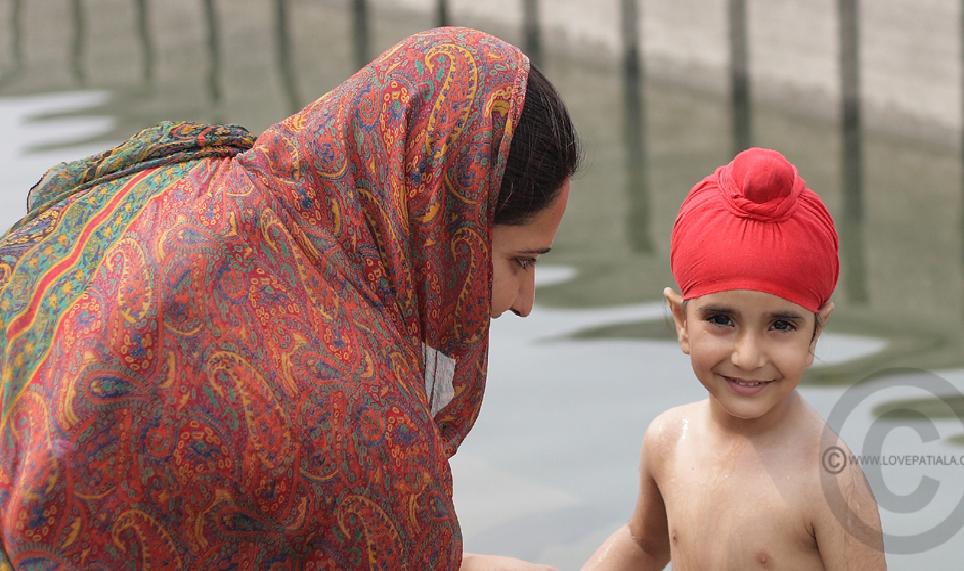 There was an interesting whimsical read in the Wall Street Journal by a Yale Law Professor, titled “Why Chinese Mothers Are Superior” The article states that the ethnicity has some possible substitutions, so I indulged, as its main opposition is suppose to be something called “Western.”
There was an interesting whimsical read in the Wall Street Journal by a Yale Law Professor, titled “Why Chinese Mothers Are Superior” The article states that the ethnicity has some possible substitutions, so I indulged, as its main opposition is suppose to be something called “Western.”
Here are some of its insights:
A lot of people wonder how Chinese parents raise such stereotypically successful kids. They wonder what these parents do to produce so many math whizzes and music prodigies, what it’s like inside the family, and whether they could do it too. Well, I can tell them, because I’ve done it. Here are some things my daughters, Sophia and Louisa, were never allowed to do:
- attend a sleepover
- have a playdate
- be in a school play
- complain about not being in a school play
- watch TV or play computer games
- choose their own extracurricular activities
- get any grade less than an A
- not be the No. 1 student in every subject except gym and drama
- play any instrument other than the piano or violin
- not play the piano or violin.
For more discussion, click below the fold
Guest blogged by Ajaib Kaur
Amrita (Ami) Kaur Dang’s sound often is described as a “blend” of the classical (traditional) and the experimental (non-traditional). Tossing together her North Indian vocal training with impressive sitar skills, she playfully builds collages of inquiry. Also creating the feel of a fireside gathering for trans-national, digital, post-modern sound to question everything. While a blend or an intersection might be an easier way to describe Amrita’s style to a western audience, I find her sound to be an embodiment of the everyday Sikh experience.
Click here to listen to her track “Strange Community.”
The mesmerizing loops and samples, of each track on Amrita’s full length debut album “Hukam” capture the repetitive daily dance we each participate in. Within each track there are varying sensibilities of bargaining, or even resignation, but often vigor and passion that all listeners can relate to.
Guest blogged by Navdeep Singh Dhillon
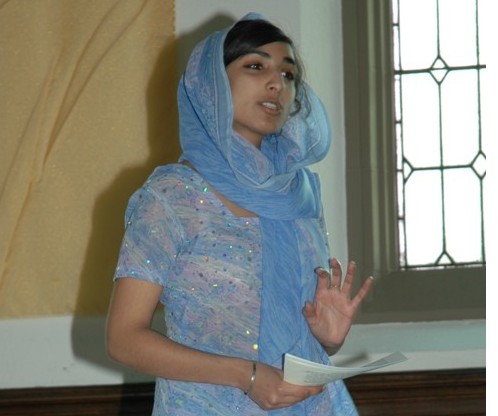 For my first post as a guest blogger, I wanted to address an issue that has been irritating me since September, when I first read about it. [An anonymous] Mehmaan wrote a post titled “Valarie Kaur, the peddler of self-promotion.” Mehmaan’s claim is essentially that Valarie Kaur is a big pakhandi.
For my first post as a guest blogger, I wanted to address an issue that has been irritating me since September, when I first read about it. [An anonymous] Mehmaan wrote a post titled “Valarie Kaur, the peddler of self-promotion.” Mehmaan’s claim is essentially that Valarie Kaur is a big pakhandi.
Mehmaan’s singular criterion for reaching the conclusion that Valarie Kaur is not just a pakhandi, but a big pakhandi, is that she is using social media and her website to promote herself as a speaker and to sell her documentary, “Divided We Fall,” inaccurately called a “movie” in the post.
I have never met Valarie and don’t know her family, but do want to clarify Valarie Kaur’s achievement, relegated to the realm of frivolity with the express purpose of making money, by Mehmaan in order to prove a point.
On September 11, the mood against anyone brown, especially Sikhs, changed drastically, and it culminated with the murder of Balbir Singh Sodhi on September 15. At that time, there was no Twitter. There was no Facebook. Even text messaging wasn’t normal everyday behavior. So there was no immediacy with information. I remember receiving emails through newsgroups I happened to be a part of documenting the steadily rising violence and blatant racism towards brown people. And then switching on my television to see zero updates on the “backlash.” Instead, it was just the same devastating image of planes crashing into the Twin Towers, followed by a turbaned and bearded Bin Laden. So what Valarie Kaur did at 20-years-old is nothing short of phenomenal. Along with her cousin, she went to document the brown experience on a cross-country trip, armed with plenty of panache, zero technical skills and a video camera. The fact is that there is no other documentary, which I am aware of, that weaves such a powerful narrative, intermingling a compelling personal story, and creating the link between not only Sikhs, but anyone of color, including the Japanese-American survivors of camps in the United States.
Last week I attended a diwan of about 50 people on a Thursday night on the east side of Manhattan, in New York City. The Manhattan Sikh Association (MSA) has been organizing monthly diwans in NYC for years now in apartment buildings and other temporary locations, but recently the group opened up a permanent space on East 30th street and Park avenue in Manhattan, making it the island of 2 million inhabitants’ first gurdwara.
I’ve always enjoyed attending the intimate MSA diwans, which tend to attract a lot of young Sikh professionals who live or work in Manhattan and the surrounding areas. Even the New York Times was intrigued by MSA and did a story on them last year. As I sat in their new space last Thursday, I felt calm and at peace, no one was yelling at me about the latest gurdwara politics**, and my peers, many of whom were second generation Americans like myself, were the ones doing kirtan, leading Rehras Sahib and Ardas, and in short, running the show. One young Sikh did a brief and conversational viakhia (commentary) in English of his shabad before he started singing. I thought to myself, this is a spiritual space.
Sadly, a spiritual space for sangat to come together, reflect and grow is a far stretch from what most gurdwaras I’ve attended in North America feel like.
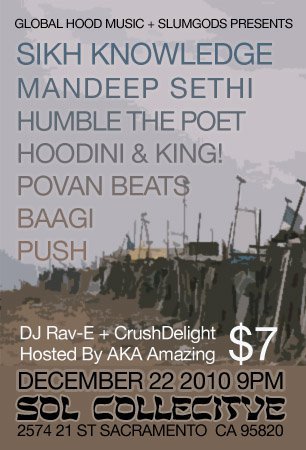 So, in the new year we’ll be bringing about some changes to TLH and we hope that one of these changes will be a better way of highlighting events happening in and around North America.
So, in the new year we’ll be bringing about some changes to TLH and we hope that one of these changes will be a better way of highlighting events happening in and around North America.
In the meantime, for our California Langar Hall family, you can catch Sikh Knowledge + Mandeep Sethi + Humble the Poet + Hoodini & King! + Povan Beats + Baagi + Push at Sol Collective on December 22nd starting at 9pm. The event will be hosted by the very funny AKA Amazing.
Please view the facebook event page here and a video below highlighting many of these artists. The video is filmed by the very talented, Digitology.
 The Chair of the US House of Representatives Foreign Relations Committee, Rep. Howard Berman, is trying to push a resolution through Congress today “condemning unilateral declarations of a Palestinian state.”
The Chair of the US House of Representatives Foreign Relations Committee, Rep. Howard Berman, is trying to push a resolution through Congress today “condemning unilateral declarations of a Palestinian state.”
The United Nations has long recognized the sovereignty of the Palestinian people in the Occupied Palestinian Territory, including East Jerusalem as a matter of international law. Since 1975 the UN has recommended that the Palestinian people be able “to exercise their inalienable rights to self-determination, national independence and sovereignty; and to return to their homes and property.”
There is growing consensus around the rest of the world in support of Palestinian sovereignty and statehood, yet two countries stand in the way: Israel and its fiscal sponsor, the United States.
I just received notice from the US Campaign to End the Occupation about this horrifying resolution that will be voted on today.
For those of you who are following the Sikh hip-hop scene, Navdeep Singh Dhillon’s blog has a good overview of each of the musicians who’ll be in attendance at the upcoming Lahir 2010: Move the Movement event in New Jersey. Here’s an excerpt about one of the rappers whose name means Rebel,
Baagi Gunjiv is one of the very few rappers out there who raps in Punjabi. The only other one that I can think of is Bohemia, and his songs are all about “thug life” in Oakland and Sacramento. Not that there’s anything wrong with that =) So just the fact that he is rapping in Punjabi and rapping about social issues like farmer suicides, droughts, and 1984, is hopeful, but he doesn’t really have very many songs out there to draw a conclusion from. The only other one I have heard, “Baagi di Vaari” was produced by Sikh Knowledge so it sounds very professional, but content-wise, it is a bit vapid. In his defense, the chorus “Bubbe noon kanna, te Gugge noon bihari” which details the two punctuation marks required to write his name in Gurmukhi, falls in line with any other debut rapper. “What’s my name? Snoop Doggy Dog.” “I’m Bushwick Bill, but you can call me Richard.” “Vanilla Ice Ice Baby,” “Hi, my name is. Slim Shady.”
So I am looking to forward to seeing what else he comes up with and remain optimistic that he will be the breath of fresh air for Punjabi music, both in Punjab and overseas so we can move more towards heightening the consciousness of the masses rather than songs like Diljit’s deep lyrics: “Chandigarh vich kudi milli, chocolate vargi” which I can’t even bring myself to translate. [link]

Though Sikhs have settled all around the world, roughly 20 million Sikhs still reside in Punjab. There, and elsewhere, Sikhs are facing serious problems including, but not limited to: farmer suicide, female infanticide, drugs and alcohol abuse, domestic violence, economic disasters, disease, poverty, illiteracy, and much more. [Lahir Press Release]
Many of my most recent posts have been about upcoming events happening in the Sikh Community. I think this is a positive sign – that rather than idly discussing and debating issues that inflict our panth, we are actually doing something about it! I would like to highlight two upcoming events occurring in North America. These platforms will bring together talented youth to raise awareness and by doing so, will aim to address important issues within our community. Please support these endeavors so that we can continue to move our panth in the right direction.
Lahir: Save Punjab. Save Ourselves | New Jersey | November 20th | 6pm
Lahir: Move the Movement 2010 is a night of spoken word, poetry, music, and the arts. Artists will include G.N.E., Hoodini, Mandeep Sethi, Gunjiv “Baagi” Singh, MC G-Singh and Humble the Poet. The event will kickoff the movement to respect and protect Punjab by donating all profits to the Baba Nanak Education Society (BNES), an organization which provides humanitarian assistance in rural Punjab to next of kin of suicide victims. These are families with small children left completely destitute by the death of bread-winners and have been neglected by the government. A donation of approximately $350 can help support one family for a year. For more information, visit the facebook page.
We have previously written about SikhLens, an art and film festival which brings together Sikh filmmakers, authors, artists and actors. For those of you who support the development of Sikh arts, you will be pleased to know that the second annual Sikh Art and Film Festival (SAFF) will be held from November 19th-21st, 2010 at the Dodge College of Film and Media Arts at Chapman University in Orange, CA. SAFF provides a venue for artists to present their “Sikh-centric” films, art, and music to the broader community with the intent of showcasing their talents and generating increased Sikh awareness.
The Festival begins Friday, November 19th with a red-carpet Opening Night starting at 7:30 pm. A youth-focused cluster will start off the Saturday events. This cluster focuses on films and live book readings intended to incite interest and inspire youth, while teaching about Sikh history. The focus then turns to creative Sikhs in the Visual, Audio and Entertainment Industries. Hear their stories, watch and listen to their craft, and interact with and support Sikhs breaking ground in these unique areas. Also introducing for the first time an interactive segment on “Introduction to Film-making,”to demystify the film-making process. Rounding out the day’s events are a series of short films featuring a wide variety of genres, an eclectic mix of filmmakers, and a unique blend of topics, including special selections from the SikhNet Youth Online Film Festival. Sunday’s events start with an international flavor, with an emphasis on Sikh films and artists from all over the world. The concluding cluster of the festival will touch upon Social Issues within the Sikh Diaspora. This segment is aimed to bring upon a meaningful and insightful look into the surroundings of the Sikh Community today.
I am especially interested in this final cluster which brings together films addressing the social issues that inflict our community. We have spoken many times on this blog about how media and film are critical to dialoguing about important issues.
I just came across this great campaign to urge the American public to stop calling immigrants “illegals.” Brought to us by the racial justice media organization Colorlines, the “Drop the I-Word” Campaign website states, “The I-Word creates an environment of hate by exploiting racial fear and economic anxiety, creating an easy scapegoat for complex issues, and OK-ing violence against those labeled with the word.”

